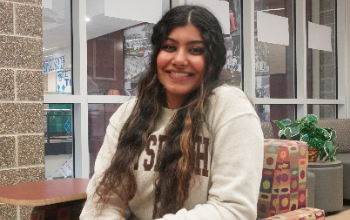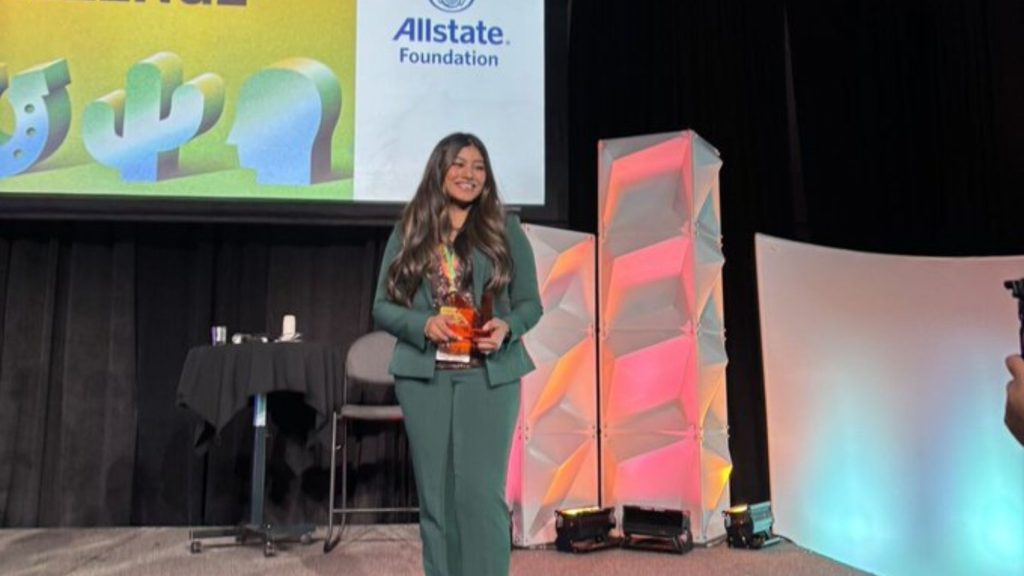(April 12, 2025) Indian-American teen’s journey began with a simple yet powerful question: how could technology help children with autism overcome the challenges they face every day? While observing that many children were struggling with communication and social interaction —compounded by increased autism diagnoses after the COVID-19 pandemic — Nandana Menon wondered if there could be a better way to support them. “Seeing developmental delays in children and noticing their over-reliance on screens really made me want to understand more about autism,” she explains. This observation lit a spark in her mind that would eventually evolve into an innovative solution.

Recently, she won first place in the Student Impact Challenge at the SXSW EDU Expo—a win that promises real community change. Her project, an educational app called “Spark,” supports children with autism by providing personalized therapy plans, sensory tools, and guidance for caregivers. Originally developed as a Girl Scouts Gold Award project, “Spark” has evolved into a comprehensive tool set to change how families access autism support. Nandana’s win at SXSW EDU shows that her idea meets a pressing need for better support for autistic children and their families.
A Local Observation That Sparked Global Change
For Nandana, the idea for “Spark” came from seeing real challenges around her. “I noticed that many kids in my community weren’t playing with others; instead, they were glued to their phones, and if those were taken away, they sometimes had tantrums,” she recalls. Traditional therapies often fall short of addressing each child’s unique needs, which pushed her to develop an app that can adapt to each child. “I think it’s really, really difficult to find a one-size-fits-all solution because every child’s autism is different,” she explains. With this in mind, she initially focused on high-functioning autistic children, designing learning modules that help build basic skills like communication, counting, and language, along with calming breathing exercises for when a child feels overwhelmed.


Her work on “Spark” quickly caught the attention of local technology experts and educators. Through her participation in the LAUNCH program—a STEM initiative for high school girls sponsored by the Pittsburgh Technology Council—Nandana honed her app design skills and refined her ideas. “LAUNCH introduced me to different technology tools and made me realize that there wasn’t an app out there to supplement existing therapies for high-functioning autistic children,” she recalls. The program gave her both the technical skills and the confidence to follow her vision, reinforcing her belief that technology can make a real difference.
At South Fayette High School, where Nandana holds several leadership roles—including President of the National Honor Society, Student Representative on the School Board, and Facilitator for the Superintendent’s Leadership Advisory Committee—she found a supportive environment that boosted her ambition. The school’s strong focus on STEM education and community service helped nurture her innovative spirit. “Our school is always sharing great opportunities with us,” Nandana says. “If I hadn’t applied for LAUNCH, none of this would have come to life.”


Blending Technology and Compassion for Practical Impact
Beyond the classroom, Nandana has worked closely with professionals to make sure “Spark” is both effective and safe. Experts from CGI and the University of Pittsburgh’s Autism Clinic have joined her in design workshops to check the app’s functionality. “They treat me like the project manager, even though they are all experienced professionals,” she says. “It’s really empowering to have my ideas heard and to see them become part of a real project.” A proof of value statement from CGI—documenting all her coding, design, and planning work—demonstrates her hard work. “I’ll be able to use that document when I apply for colleges and scholarships,” she explains, emphasizing the lasting impact of her efforts.
In addition to the app, Nandana created an online resource at autismunityinitiative.org. The website offers a full list of support organizations and video interviews with autism professionals to complement the app’s features. She also founded the Autism Unity Initiative (AUI), a nonprofit dedicated to supporting autism care. “The app is completely free, and so is the website. From the start, we just wanted to help people,” she emphasizes.
Nandana’s work goes beyond technology—she is also committed to empowering her community. At South Fayette High School, she shows leadership by advocating for student voices on the School Board and by leading the National Honor Society. Balancing these roles with developing her innovative app highlights her strong dedication and excellent time management skills.
Looking ahead, Nandana plans to keep improving “Spark” and expand the Autism Unity Initiative. She wants to add new features to the app—like allowing parents to get real-time answers from professionals—and update the online resource hub regularly. Her goal is to ensure that families have the tools they need to help their children thrive.
Nandana Menon’s story isn’t just about winning a competition or creating an app. It’s about a young innovator who saw a problem and took real steps to solve it. Nandana is building a future where technology and care work together to help those who need it most. Her work shows that when practical ideas are pursued with dedication and teamwork, they can truly make a difference, one step at a time.
- Follow Nandana Menon on LinkedIn
ALSO READ: Anushka Naiknaware: The young scientist who revolutionised wound care




